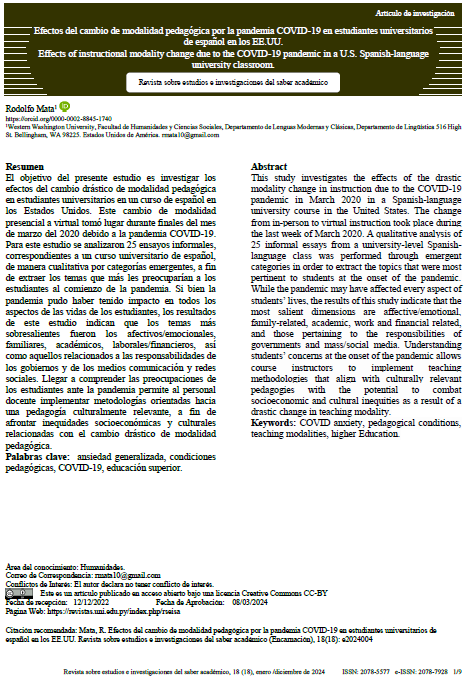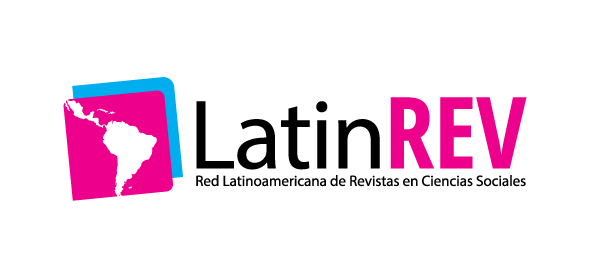Effects of instructional modality change due to the COVID-19 pandemic in a U.S. Spanish-language university classroom
DOI:
https://doi.org/10.70833/rseisa18item341Keywords:
COVID anxiety, pedagogical conditions, teaching modalities, higher eduacationAbstract
This study investigates the effects of the drastic modality change in instruction due to the COVID-19 pandemic in a Spanish-language university course in the United States. The change from in-person to virtual instruction took place during the last week of March 2020. A qualitative analysis of 25 informal essays from a university-level Spanish-language classroom was performed through emergent categories in order to extract the topics that were most salient to students at the onset of the pandemic. While the pandemic affected every aspect of students’ lives, the results of this study indicate that the most salient dimensions are affective/emotional, family-related, academic, work and money related, and those pertaining to the responsibilities of governments and mass/social media.
Downloads
References
ACTFL: American Council for the Teaching of Foreign Languages (2012). Guías de Capacidad Lingüística de ACTFL 2012 – Comunicación Escrita. https://www.actfl.org/resources/actfl-proficiency-guidelines-2012/spanish/
Cáceres González, C., Hernández Sánchez, B., & Takahiro Tanii, R., (2020). Inteligencia emocional percibida en universitarios en tiempos de Covid-19: un aporte a su salud mental. Revista sobre estudios e investigaciones del saber académico (Encarnación), 14(14): 37-43. https://publicaciones.uni.edu.py/index.php/rseisa/article/view/270
Denardi, D. A. C., Marcos, R. A., & Stankoski, C. R. (2022). Impacts from Covid-19 pandemic in English language classroom. Ilha Do Desterro, 74, 113-143.https://doi.org/10.5007/2175-8026.2021.e80733
Echeverría, G. (2005). Análisis cualitativo por categorías. Santiago, Chile: Universidad Academia de Humanismo Cristiano. Escuela de Psicología.
Hapsari, C. T. (2021, March). Distance learning in the time of Covid-19: Exploring students’ anxiety. In ELT Forum: Journal of English Language Teaching (Vol. 10, No. 1, pp. 40-49). https://doi.org/10.15294/elt.v10i1.45756
Kim, L.E., Leary, R., & Asbury, K. (2021) Teachers’ narratives during COVID-19 partial school reopenings: an exploratory study. Educational Research, 63(2), 244-260. https://doi.org/10.1080/00131881.2021.1918014
Kosciejew, M. (2022). Remembering COVID-19; or, a duty to document the coronavirus pandemic. IFLA journal, 48(1), 20-32. https://doi.org/10.1177/03400352211023786
Ladson-Billings, G., (2009). The Dreamkeepers: Successful teachers of African American children (2nd ed.). San Francisco: Jossey Bass.
Ladson-Billings, G. (2021). I’m here for the hard re-set: Post pandemic pedagogy to preserve our culture. Equity & Excellence in Education, 54(1), 68-78.
https://doi.org/10.1080/10665684.2020.1863883
Liu, M., & Yuan, R. (2021). Changes in and effects of foreign language classroom anxiety and listening anxiety on Chinese undergraduate students’ English proficiency in the COVID-19 context. Frontiers in Psychology, 12, 670824. https://doi.org/10.3389/fpsyg.2021.670824
Mihai, M., Albert, C. N., Mihai, V. C., & Dumitras, D. E. (2022). Emotional and Social Engagement in the English Language Classroom for Higher Education Students in the COVID-19 Online Context. Sustainability, 14(8), 4527. https://doi.org/10.3390/su14084527
Montiel, M., Feris, R., Fonseca, & Arrúa K. (2020). Condiciones de los estudiantes de la educación superior en tiempo de, COVID-19. Revista sobre estudios e investigaciones del saber académico (Encarnación), 14(14): 82-86. https://publicaciones.uni.edu.py/index.php/rseisa/article/view/277

Published
How to Cite
License
Copyright (c) 2024 Rodolfo Mata

This work is licensed under a Creative Commons Attribution 4.0 International License.
Creative Commons Attribution License CC-BY
You are free to:
Share — copy and redistribute the material in any medium or format.
Adapt — remix, transform, and build upon the material for any purpose, including commercially.
Under the following terms:
Attribution — You must give appropriate credit, provide a link to the license, and indicate if any changes have been made. You may do so in any reasonable way, but not in any way that suggests that you or your use is endorsed by the Licensor.






